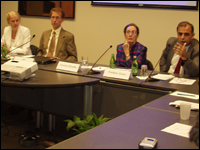Registration
You will receive an email confirming your registration.
IMGXYZ906IMGZYX On June 5, 2008, the Carnegie Endowment for International Peace hosted a discussion on Pakistan’s economic and social challenges and prospects. Featured speakers included Jan Vandemoortele, Senior Advisor on Policy at UNICEF and former UN Resident Representative in Pakistan for humanitarian issues; Ambassador Teresita Schaffer, Director of the South Asia Program at the Center for Strategic and International Studies; and Frederic Grare, visiting scholar in the South Asia Program at the Carnegie Endowment. Sandra Polaski, Director of the Trade, Equity, and Development Project at the Carnegie Endowment, moderated the event.
Jan Vandemoortele opened the discussion with an overview of Pakistan’s uneven performance in achieving human development goals. The country has made some limited progress on poverty and health indicators, yet its education outcomes remain well below those of other countries at similar levels of development. Mr. Vandemoortele attributed these poor results to a lack of investment: the country spends only about 2.5% of GDP on health and education, whereas most countries that have grown on a sustained basis have spent at least 7%. He stated that Pakistan’s recent economic success has produced “growth without development,” as there had been little structural change in the economy and only a narrow distribution of its benefits. He estimated that those in the bottom half of the income distribution had seen no gains.
Today Pakistani society is extremely polarized – along gender, economic, geographic, religious, and ethnic lines – preventing the social cohesion necessary for broad-based, inclusive growth, he continued. Mr. Vandemoortele concluded by noting that, while Pakistan is in need of reform, it is imperative that the international community grant it the policy space necessary to develop local solutions for its specific problems; too much foreign involvement would likely be counterproductive, fueling the causes of extremists and undermining moderates.
Teresita Schaffer broadly agreed with Mr. Vandemoortele’s assessment. She asserted that Pakistan has failed to sufficiently invest in its people; this is a shortcoming not only of the current government, but has been a constant problem under a succession of governments. Such underinvestment is directly responsible for the poor social and economic statistics Vandemoortele presented. Schaffer also stressed Vandemoortele’s final point on policy space, stating that given the current political climate in Pakistan any new policies which appear to be at the behest of Washington will fail.
Frederic Grare concurred with the problems which Mr. Vandemoortele and Ms. Schaffer had outlined, but maintained that there was reason for greater optimism than the previous speakers had found. He asserted that though there was significant social polarization in Pakistan, the country did in fact have a history of national cohesiveness, and that effective policies could further unify the people. Mr. Grare noted that the military/civilian divide which had grown in recent years is now being reversed, another positive development. He concluded by stating that while the current outlook for Pakistan certainly wasn’t great, the country would continue to muddle through, and noted that as a younger generation came into government outcomes would likely begin to improve.
During the question and answer session following the presentations, Kenneth Dillon of Scientia Press asked how significant Pakistan’s environmental problems were, and whether they were likely to have an impact on economic growth. Mr. Vandemoortele replied that the government is becoming conscious of Pakistan’s serious and growing environmental problems, but he was unsure whether or not it would succeed in addressing them. As yet there has been little impact on the economy, but if land erosion and high levels of water salinity continue to spread throughout the country, agricultural production will suffer tremendously.
David Orden of the International Food Policy Research Institute asked the panel what role trade with India could play in Pakistan’s economic development. Mr. Vandemoortele responded that economic diplomacy between Pakistan and India is growing, as today many Indian information technology companies have begun subcontracting some of their work to lower-wage Pakistani firms. He stated that the politicians and bureaucrats need to catch up to the business community by further easing trade restrictions between the two countries. Ms. Schaffer stated that while the potential for trade with India was huge, actual trade has so far remained modest. She agreed that the politicians have been an obstacle to greater trade, as they are protecting domestic sectors that are afraid of import competition. Mr. Grare added that with respect to the Indian economy, some Pakistani sectors are defensive, because they fear they can’t match its dynamism.
In response to other questions, the panelists stated that improved security and stability were essential to maintain foreign confidence in Pakistan’s economy and increase foreign investment; that land reform could produce great gains for the economy, but is unlikely to happen anytime soon due to the political clout of large land owners; that, with respect to health and education, the government needs to both spend more money and spend more effectively; and that the military continues to control a significant portion of the economy, which has both positive and negative impacts.
